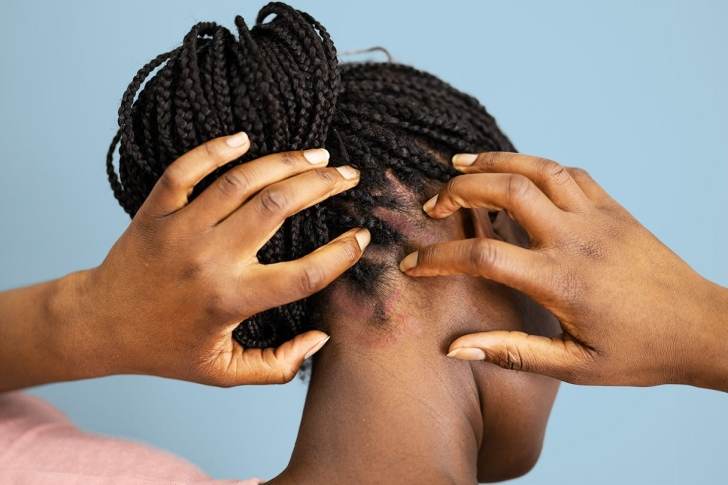Scalp Psoriasis: Causes, Symptoms, and Treatments
Scalp psoriasis is a common condition characterized by red, itchy patches on the scalp. Understanding the underlying causes can help in managing and treating this chronic disease effectively. Here’s a detailed look into what causes scalp psoriasis.

Understanding Scalp Psoriasis
Scalp psoriasis is a type of psoriasis that appears on the scalp, causing raised, reddish, and often scaly patches. This condition can extend beyond the hairline, affecting the forehead, back of the neck, and around the ears.
Key Characteristics
- Red patches of skin
- Silvery-white scales
- Dry scalp
- Itching or soreness
- Temporary hair loss
Causes of Scalp Psoriasis
The exact cause of scalp psoriasis is not fully understood, but several factors contribute to its development.
Genetic Factors
- Family History
- Psoriasis tends to run in families. If a close relative has psoriasis, your chances of developing it increase significantly.
- Genetic Mutations
- Specific genetic mutations are associated with psoriasis, affecting the immune system’s regulation.
Immune System
- Autoimmune Response
- Psoriasis is an autoimmune condition where the immune system mistakenly attacks healthy skin cells. This leads to rapid skin cell turnover and the buildup of scales.
- Inflammation
- Chronic inflammation in the body is a key feature of psoriasis, contributing to the symptoms.
Environmental Triggers
- Stress
- High levels of stress can trigger or worsen psoriasis flare-ups.
- Infections
- Certain infections, such as strep throat, can trigger psoriasis.
- Skin Injuries
- Cuts, scrapes, or burns can lead to a phenomenon called the Koebner effect, where new psoriasis lesions form at the site of the injury.
- Weather
- Cold, dry weather can exacerbate symptoms, while warm, sunny climates may improve them.
Comparison of Contributing Factors
| Factor | Impact on Psoriasis | Example |
|---|---|---|
| Genetic Factors | High | Family history, genetic mutations |
| Immune System | High | Autoimmune response, inflammation |
| Environmental Triggers | Moderate to High | Stress, infections, skin injuries, weather |
Q&A Section
Q: Can scalp psoriasis spread to other parts of the body? A: Yes, while it typically affects the scalp, it can spread to other areas like the forehead, neck, and behind the ears.
Q: Is scalp psoriasis contagious? A: No, scalp psoriasis is not contagious. It cannot be spread through touch or close contact.
Q: What are common treatments for scalp psoriasis? A: Treatments include topical corticosteroids, medicated shampoos, phototherapy, and systemic medications for severe cases.
Professional Analysis
Genetic Predisposition
Studies show that psoriasis is hereditary. If one parent has psoriasis, the risk of a child developing the condition is about 10-15%. If both parents are affected, the risk increases to about 50%.
Immune System Dysfunction
Psoriasis is linked to an overactive immune system. T-cells, a type of white blood cell, mistakenly attack healthy skin cells, leading to rapid cell production and inflammation. This immune response is a core component of the disease.
Environmental and Lifestyle Triggers
Stress management is crucial for individuals with psoriasis. Techniques such as yoga, meditation, and regular exercise can help reduce flare-ups. Additionally, avoiding known triggers like certain medications, alcohol, and smoking can improve symptoms.
Treatment Options
Topical Treatments
- Corticosteroids
- Reduce inflammation and slow down skin cell production.
- Vitamin D Analogues
- Help to slow skin cell growth.
- Salicylic Acid
- Removes scales and smooths the skin.
Systemic Treatments
- Oral Medications
- Used for severe cases to suppress the immune system.
- Biologics
- Target specific parts of the immune system.
Light Therapy
- Phototherapy
- Uses ultraviolet light to slow down skin cell turnover.
Table: Comparison of Treatment Options
| Treatment Type | Method | Effectiveness | Side Effects |
|---|---|---|---|
| Topical Treatments | Applied directly to the scalp | Moderate to High | Skin thinning, irritation |
| Systemic Treatments | Oral or injected medications | High | Immune suppression, liver damage |
| Light Therapy | UV light exposure | Moderate | Skin aging, increased cancer risk |
Citations







Recent Comments